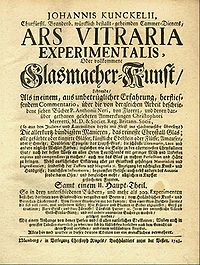Jean Kunckel
| Naissance | |
|---|---|
| Décès | |
| Activités |
| Membre de |
|---|
Jean Kunckel de son vrai nom Johann von Löwenstern Kunckel (vers 1620-1638[1], Wittenberg – , Bernau bei Berlin) est un chimiste allemand, technicien du vitrail.
Biographie
[modifier | modifier le code]Jean Kunckel est un chimiste. Il fait plusieurs découvertes, notamment, il isole le phosphore en 1674[2], même si cet élément chimique a déjà été découvert en 1669 par son compatriote l'allemand Hennig Brandt.
En 1679, il publie un traité L'Ars vitraria experimentalis. À côté des œuvres d’Agricola (De re mettalica, 1556[3]), de Besson (Théâtre des instruments mécaniques, 1578) ou de Jousse (Théâtre de l’art du charpentier, 1627), le traité de Jean Kunckel montre que la technique, bien avant le XVIIIe siècle, était déjà souvent en de nombreux domaines comprise et synthétisée[1].
Charles XI lui a donné la charge de « conseiller des mines ».
Œuvres
[modifier | modifier le code]
- Expériences sur les sels fixes et volatils (1676, Hambourg), traduit en latin par Ramsay (1678, Londres)
- Observations chimiques (1677), également traduit en latin par Ramsay (1678)
- L'Art de faire le verre (1679), traduit en français par le baron d'Holbach (1752)
- Une lettre sur le Phosphore (1678) où il expose sa découverte.
- L'Ars vitraria experimentalis (1679).
Notes et références
[modifier | modifier le code]- Histoire des techniques - Bertrand Gille
- M.F.-E. Guerin, Dictionnaire pittoresque d'histoire naturelle et des phénomènes de la nature, vol. 7, Imprimerie de Cosson, , 640 p. (lire en ligne), p. 405.
- [Agricola 1556] (la + en) Georg Agricola, Herbert Hoover et Lou Henry Hoover, De re metallica, Translated from the First Latin Edition of 1556, New York, Dover Publications, , sur archive.org (lire en ligne). Traduction française par A. France-Lanord (1992), éd. Gérard Kloop, Thionville.
Bibliographie
[modifier | modifier le code]- (s. dir.), Bertrand Gille : Histoire des techniques, Gallimard, coll. « La Pléiade », 1978 (ISBN 978-2070108817)
Liens externes
[modifier | modifier le code]
- Ressources relatives aux beaux-arts :
- Notices dans des dictionnaires ou encyclopédies généralistes :
Text is available under the CC BY-SA 4.0 license; additional terms may apply.
Images, videos and audio are available under their respective licenses.

